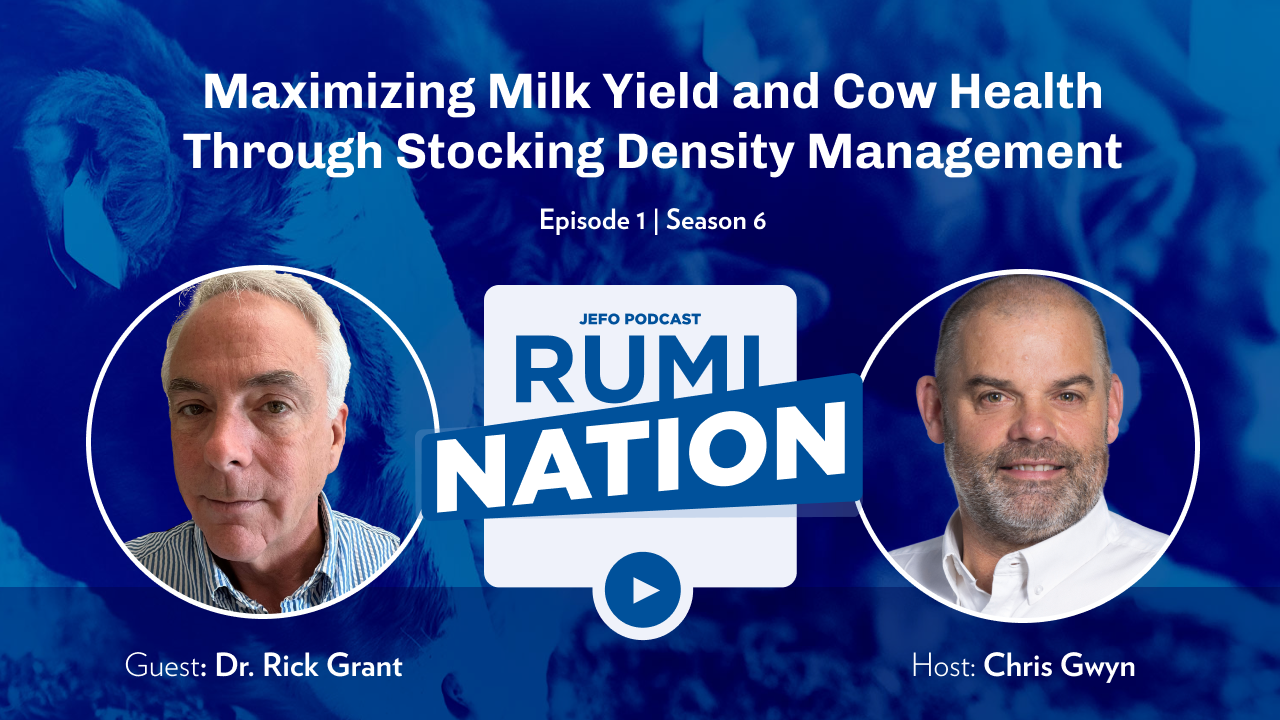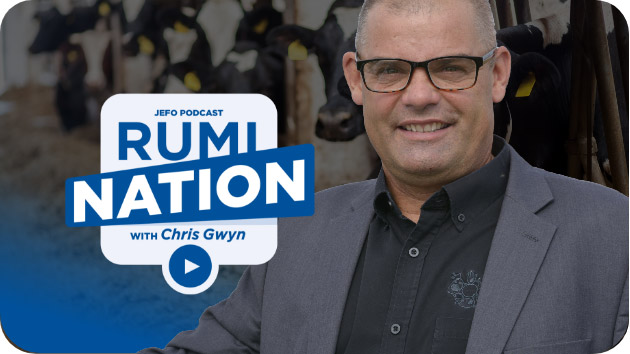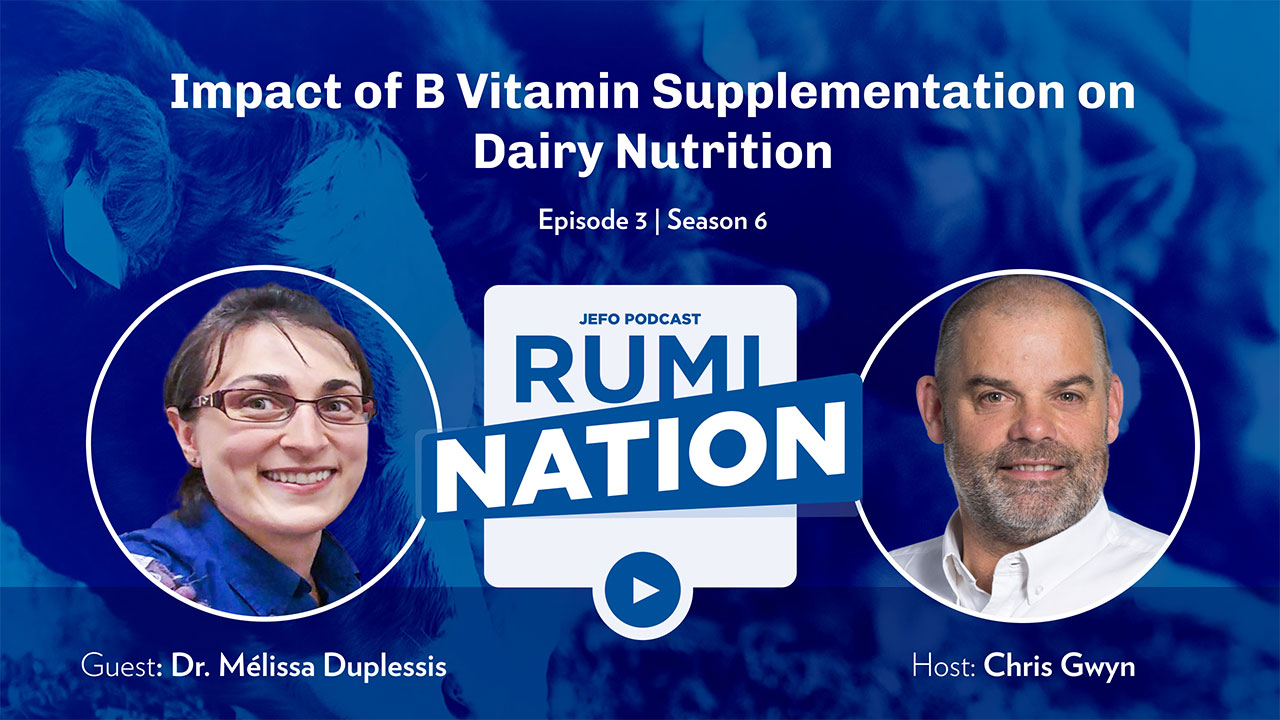RumiNation | S06 : E02
Managing Consistency to Improve Fresh Cow Health
Brought to you by Jefo Nutrition
Share now!
Did you enjoy this episode?
Share now!
Managing Consistency to Improve Fresh Cow Health
In this episode, Chris and Dr. Trevor DeVries explore how stressors like heat, overcrowding, regrouping, and inconsistent management impact transition cows, emphasizing the importance of minimizing stress to improve health, intake, and production outcomes.
Our guest - Dr. Trevor DeVries
Dr. Trevor DeVries is a Professor and Canada Research Chair in the Department of Animal Biosciences at the University of Guelph. In that position, Trevor leads a highly productive, award-winning research program and has published over 225 peer-reviewed papers focused on dairy cattle nutrition, management, behavior, and welfare.

Timestamps & Summary
Chris Gwyn (02:35)
Dr. Devries, your lab has been extensively and intensively looking at cow management and nutrition factors and their associations and correlations with early lactation outcomes. Why don’t you give us an overview of this most recent study design.
Dr. Trevor DeVries
Yes, this is a large study that we recently undertook with a large cohort of dairy farms in southwestern Ontario. […] Not specifically looking at milking system effects, but looking at the management of those cows during the dry period, their nutritional management during that time period, and looking at not only how it impacted the cows during that time period, but also those cows as they transitioned after calving, and looked at the fresh cow success of the cows on those farms and correlating that back to differences in management, differences in environmental conditions, and particularly things like heat stress.
Chris Gwyn (05:22)
One of the factors that came out is that you and your team demonstrated pretty large variation and differences between formulated diet and the diet that was fed at the farm level. And I was wondering if you could dig down a little deeper into that and share some of the other key findings and information from this study.
Dr. Trevor DeVries
One of the factors that we were interested in from a stress standpoint was dietary and looking at differences in diets. And then, one of the key things that we were really interested in was how closely those diets matched what was formulated for those farms, as well as how much variation we saw within a farm over time in terms of the diets that were delivered to the cows. […]
Chris Gwyn (12:08)
In the study, your lab looked at heat stress impacts on the cow and its relation to markers of stress associated with changes in physiology and metabolism. I’m wondering if you could share a bit more details with the audience and what you can conclude from the findings in the study.
Dr. Trevor DeVries
We knew that one of the primary factors that we were hoping to key in on was that heat stress. And so that was in itself measured through doing cow-level observation, continuous observation over time. We had records of temperature and humidity, so we could calculate THI within the close-up pens and fresh cow pens on these farms. […]
We could look at how much heat load those cows were incurring. But then we wanted to be able to link that to the cows themselves and what they were experiencing. And one of the measures, which was quite interesting, was looking at the eye temperature of the cows as a new way of looking at how much heat load those cows have. […]
Chris Gwyn (22:13)
Speaking of energy balance, [it looks as if] heat stress had an impact on glucose production. Is that something that you can comment on, as well as findings that you found from your paper?
Dr. Trevor DeVries
We didn’t look directly at glucose ourselves, but definitely from other work that’s been done by other research groups, we know […] there’s a huge potential draw, or not even potential draw, there is a huge draw of glucose when that cow calves and she starts lactating and blood glucose levels drop on a fresh cow versus a dry cow. Because again, the amount of glucose getting taken out of the system for making lactose and making milk, there’s a huge demand there. And so that drive to produce milk, and then the need for lactose trickles down to a need for glucose. And one of the challenges is that when there are things like heat stress going on, we tend to see not only things that may reduce intake in cows, that may lead to less kind of substrate availability for producing energy and glucose, but also inflammation in the gut, and things like that can cause leaky gut […]
Chris Gwyn (24:26)
Is there anything else that you wanted to add in that field of stressors and this study that you wanted to elucidate or impact for the audience?
Dr. Trevor DeVries
We talked about some of the primary stressors that we were really interested in, at least in this research, around heat stress, some of the management-related things, grouping of cows, and movement of cows. One of the things that we haven’t gone too deep into with this data set, but we know from other work, is the crowding of cows and competition of cows that can also lead to stress and more negative outcomes. And again, we know that anytime that we overcrowd cows, whether it be at the feed bunk, whether it be at the lying area, whether it’s a stall or a pack, or even the water trough, we’re going to see a negative impact on the behavior of the cows, which can then result in negative outcomes. […]
Chris Gwyn (28:21)
Before we wrap up, given what you and your team has been discovering in this research, recommendations that you would like to reinforce for dairy producers, nutritionists, veterinarians and other advisors.
Dr. Trevor DeVries
We talked about the variation in controlling variability and being consistent. Consistency is huge. And so again, one of the first things from a management standpoint, is to make sure we’re consistent. And like we mentioned before, if things are consistent and still not working the way we want things to be working, then we start evaluating those, those protocols, and those systems that we have in place. […]
Chris Gwyn (30:15)
What’s next in your research, Dr. DeVries?
Dr. Trevor DeVries
This is an area that we continue to work on, this area of management of transition cows. I’m very interested in the other transition that we talked about with cows, and that’s from lactation to the dry period. And again, there is a lot of focus on the transition from the dry period to calving. But we also note that there are potential challenges associated with drying off cows that are heavy in lactation, not only from an immediate welfare standpoint, and again, some older research on the effects on those cows from a pain standpoint, even, with utter engorgement, utter health, is also very challenging. But then those two factors actually influence inflammation in those cows. […] And so that’s kind of an exciting area that there are others working on and we’re going to be looking at as well, hopefully in the near future.







